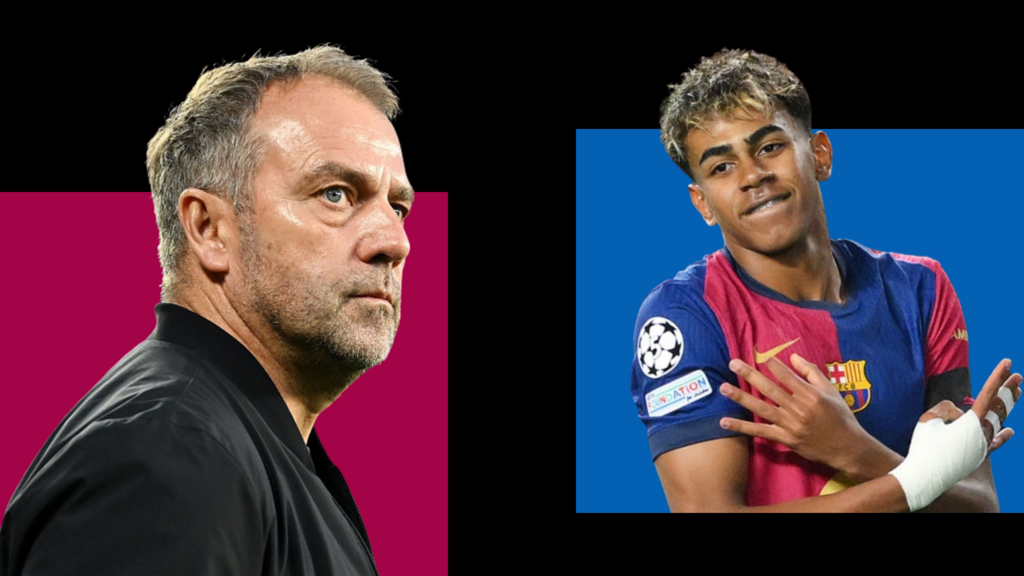Echoing Alan Hansen’s famous 1995-96 proclamation about “kids” not winning titles, Barcelona’s young squad has dramatically defied expectations.
Much like Manchester United’s Class of ’92, Barcelona’s burgeoning talent has secured a La Liga and Copa del Rey double, drawing comparisons to a generation-defining team.
Hansi Flick’s team clinched the La Liga title with a 2-0 victory over Espanyol, adding to their Copa del Rey triumph in April.
Their audacious style, marked by fearless attacking and a captivating brand of football, has captivated fans globally, rekindling enthusiasm for the club and the sport itself.
The breathtaking performances of players like 17-year-old Lamine Yamal, 18-year-old Pau Cubarsi, and 22-year-old Pedri have sparked comparisons to Pep Guardiola’s dominant Barcelona side of 2008-2011. While the comparison remains ambitious, only time will reveal the true extent of their potential.
With an average age significantly lower than any other La Liga team (25), Barcelona’s financial constraints inadvertently provided a fertile ground for youth development.
It’s crucial to remember Barcelona’s recent severe financial difficulties, hampering their ability to sign established players, let alone register existing ones.
However, Barcelona’s resurgence goes beyond simply promoting young talent.
Stunning stats and ‘Ronaldo behaviour’ – is Yamal cut out to rival Messi?
From almost quitting football to Ballon d’Or hope – Raphinha’s rebirth
Hansi Flick’s arrival brought immediate success, delivering both league and cup titles in his inaugural season.
Upon his arrival, Flick found several key players underperforming due to a perceived lack of confidence stemming from the previous coaching regime under Xavi.
Experienced players like Robert Lewandowski, Raphinha, and Frenkie de Jong suffered from low confidence and felt undervalued, with Raphinha frequently substituted early, and Lewandowski deployed in an unfamiliar role. De Jong, meanwhile, felt marginalized and targeted for a sale to alleviate the club’s financial woes.
Flick immediately addressed this by reaffirming their importance. Lewandowski subsequently led the league in scoring (25 goals), while Raphinha contributed 18.
Flick also recognized a need to integrate the club’s youth into the core of the team, rather than merely relying on them due to budgetary limitations (though Xavi deserves credit for managing under these constraints). The young players yearned for more significant roles and a voice in the team’s identity.
Flick empowered players like Gavi, Yamal, Alejandro Balde (21), and Marc Casado (21), fostering a sense of ownership and allowing them to even select the dressing room music. This trust resulted in a vibrant, expressive style of play.
He maintained strong relationships with fringe players, emphasizing that opportunities would arise due to inevitable injuries. His frugality in the transfer market is noteworthy, acquiring only Dani Olmo and Pau Victor.
He prioritizes player input on fitness, consulting them before rest decisions. He also shielded his players from excessive media pressure, remaining transparent and supportive, even during a challenging period with four losses and five points from 21 before the Christmas break.
Lamine Yamal’s rapid rise saw him achieve the milestone of 100 Barcelona appearances at an exceptionally young age.
Flick’s tactical approach evolved. The thrilling 5-4 Champions League win against Benfica in January, featuring De Jong and Olmo, revealed his preferred starting XI. This match highlighted Raphinha’s leadership qualities, solidifying his position in the team.
Recognizing a defensive leadership void, Flick integrated Inigo Martinez, asking him to adapt to an unusually high defensive line. Martinez, despite his age and previously deeper defensive positioning, embraced the challenge, demanding high standards and adhering to the tactical plan.
Flick’s management of Yamal is particularly noteworthy. While acknowledging the young star’s immense talent and desire for constant involvement, Flick subtly reins him in, emphasizing defensive responsibilities and benching him when necessary. Yamal’s impressive defensive contributions, exceeding even Pedri’s in the recent El Clásico victory, showcase this approach’s effectiveness.
A key factor in Barcelona’s success is the team’s unity, driven by leaders like Yamal, Raphinha, and De Jong. While Flick provides the strategic framework, the players deliver the passionate execution. The manager is the strategist, but the players are his dedicated forces.
Flick maintains strict standards, notably regarding punctuality. Jules Kounde faced benching three times this season for lateness, and Inaki Pena was similarly disciplined for a Supercopa semi-final. He’s also instilled a team-first mentality, discouraging extravagant fashion choices in favor of club attire for away matches.
On a personal level, Flick’s hip replacement surgery brought him renewed physical and mental clarity, profoundly impacting his coaching. This improvement in his well-being undoubtedly contributed to his success.
However, he acknowledges that this team is still under development. Their Champions League campaign demonstrated defensive vulnerabilities (24 goals conceded). The focus for the coming season is to refine their control while maintaining their dynamic attack.
With Flick at the helm, this ambition is entirely feasible. He currently has one year remaining on his contract, which he’s expected to renew, though likely without a long-term commitment.
Listen to the latest Football Daily podcast
Comments can not be loaded
To load Comments you need to enable JavaScript in your browser

